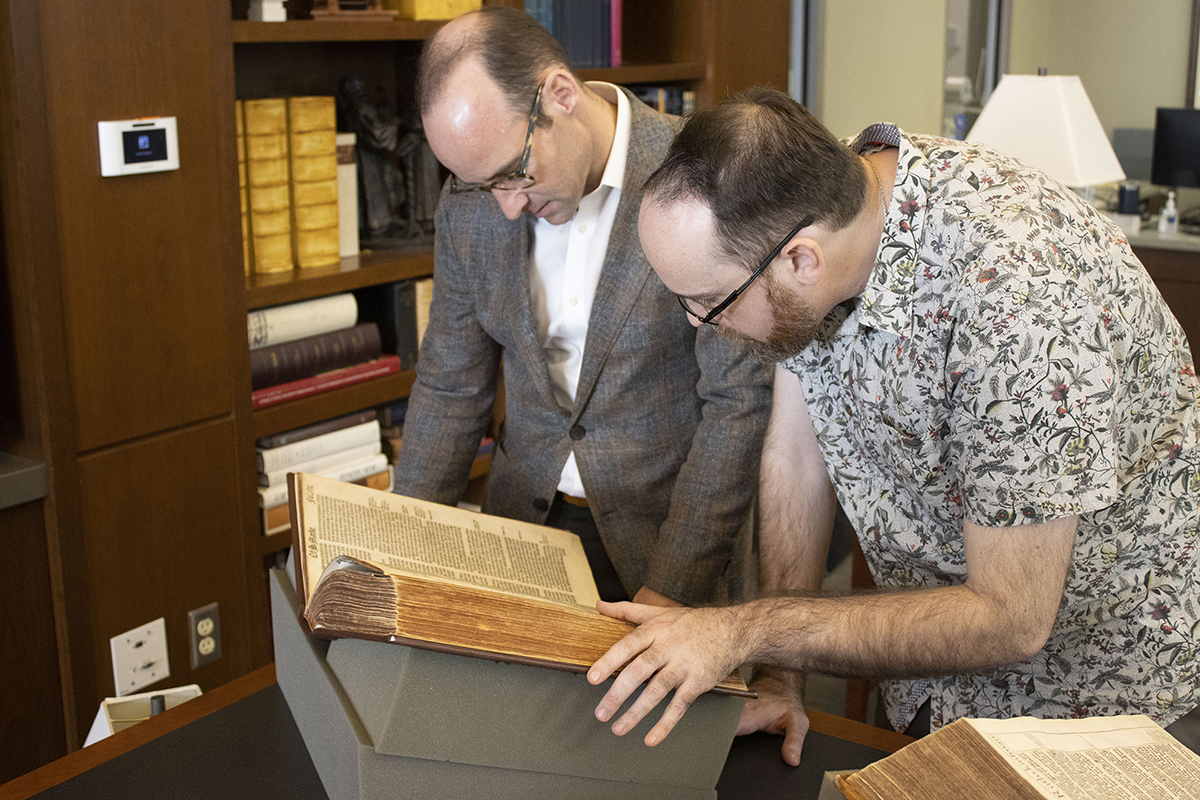Pitts Theology Library at Emory University’s Candler School of Theology has acquired a major collection of English Bibles and related literature containing more than 5,500 volumes and dating from the 16th century to today. With an estimated value of more than $2.5 million, the world-renowned collection was bequeathed to Pitts by J. Michael Morgan, a private collector and longtime friend of the library who served as organist at Atlanta’s Central Presbyterian Church and Columbia Theological Seminary. Morgan died on Christmas Day 2022, at age 74.
The J. Michael Morgan English Bible and Psalmody Collection contains English-language translations of the Bible, Psalters (books of Psalms), musical settings of Psalms and other biblical texts, copies of the Book of Common Prayer, and related devotional and liturgical materials from across the past six centuries.
“The Morgan Collection is one of the world’s most significant private collections of English Bibles, known to collectors around the globe and experienced by groups around the country,” says Richard Manly “Bo” Adams, Jr., director of Pitts Theology Library and Margaret A. Pitts Assistant Professor in the Practice of Theological Bibliography. “Pitts is honored to be the home of this Bible collection and excited about continuing the work of our friend Michael Morgan, who understood his calling to be not only preserving these treasures but ensuring they were accessible to the general public.”
A self-described individual of modest financial means, Morgan spent 50 years amassing the collection “on a church organist’s salary,” as he often quipped. He pursued a focused collection that documents the development of the Bible from the early 16th century forward, both as a religious text and as a printed artifact.
The collection includes some of the most influential Bibles in the English language, such as the first printed English translations from the early 1500s, notably the translations of William Tyndale (1494-1536) and Miles Coverdale (1488-1569). Early printings of all the “Big Bibles”—like greatest hits — of the 16th century, including the Matthew Bible (1537), the Great Bible (1539), the Geneva Bible (1560) and the Bishops’ Bible (1568), are included.
Though not the oldest volume, one of the jewels of the collection is a 1611 “He” Bible, the original printing of the King James Version. “‘He’ Bibles are so named because of a typesetting error made in the first print run, where the word ‘He’ was printed in Ruth 3:15, when it should have read ‘She,’” Adams explains. The mistake was corrected in subsequent printings of the King James, often called “She” Bibles; the Morgan Collection includes a first edition “She” Bible as well.

Pitts Director Bo Adams introduces the key text of the “He” Bible to Candler student and Pitts Theology Library student worker Aiden McMahon.
Brandon Wason, Head of Special Collections, Pitts Theology Library
Also noteworthy are the collection’s hundreds of printings of the Book of Common Prayer from the Anglican tradition, including the first edition of 1549, a first printing of the revised edition of 1662, and dozens of presentation copies and printings with significant provenance, such as the Book of Common Prayer owned by King Charles II.
Adams notes that in his connection with Pitts, Morgan was particularly impressed by the library’s dedication to programming that promotes access to rare books not only for the academic community but for those outside the academy — a value he shared. Morgan regularly took items from his collection on the road to local churches, giving several presentations a month.
“Michael’s real passion was engaging people with the Bibles,” Adams says. “Letting them see this history, that what you have in your hand is the product of 500 years of debate, translation, cultural evolution and technological innovation. Encountering one of these volumes prompts the realization that people have been reading this text for hundreds of years, and that it’s just as full of complexity and humanity for us as it was for them.”
The Morgan Collection will continue to be accessible in its new home at Pitts, where, once processed, all volumes will be available by request to library patrons, and the collection will be featured prominently in library programming, including gallery exhibitions, digitization and teaching. Pitts is raising funds to develop programming around the collection, starting with a major exhibition and events in coordination with the International Society of Bible Collectors, who are scheduled to meet in Atlanta this fall.
“It’s hard to overstate how important this collection is and what opportunities it creates for Pitts, Candler and Emory,” Adams says. “Michael’s goal was to collect all English translations of the Bible and the Psalter, and while he did not achieve this impossible task, he got closer than anyone. We are honored by his gift and will continue his work of actively engaging people with the collection.”
Learn more and support the J. Michael Morgan English Bible and Psalmody Collection.

